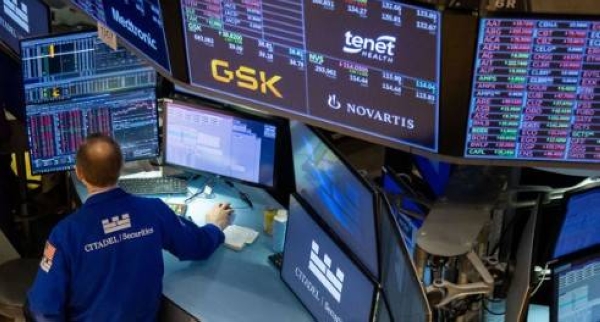NEW YORK — Global stocks have sunk, a day after President Donald Trump announced sweeping new tariffs that are forecast to raise prices and weigh on growth in the US and abroad.
Stock markets in the Asia-Pacific region fell for a second day, hot on the heels of the US S&P 500, which had its worst day since Covid crashed the economy in 2020.
Nike, Apple and Target were among big consumer names worst hit, all of them sinking by more than 9%.
At the White House, Trump told reporters the US economy would “boom” thanks to the minimum 10% tariff he plans to slap on global imports in the hope of boosting federal revenues and bringing American manufacturing home.
The Republican president plans to hit products from dozens of other countries with far higher levies, including trade partners such as China and the European Union.
China, which is facing an aggregate 54% tariff, and the EU, which faces duties of 20%, both vowed retaliation on Thursday.
French President Emmanuel Macron called for European firms to suspend planned investment in the US.
Tariffs are taxes on goods imported from other countries, and Trump’s plan that he announced on Wednesday would hike such duties to some of the highest levels in more than 100 years.
The World Trade Organization said it was “deeply concerned”, estimating trade volumes could shrink as a result by 1% this year.
Traders expressed concern that the tariffs could stoke inflation and stall growth.
In morning trading on Friday, Japan’s benchmark Nikkei 225 index fell by 2.7% and Australia’s ASX 200 was down by 1.6%. The Kospi in South Korea was flat to slightly lower.
Markets in mainland China and Hong Kong are closed for the Qingming Festival.
On Thursday, the S&P 500 — which tracks 500 of the biggest American firms — plunged 4.8%, shedding roughly $2tn in value.
The Dow Jones closed about 4% lower, while the Nasdaq tumbled roughly 6%. The US shares sell-off has been going on since mid-February amid trade war fears.
Earlier, the UK’s FTSE 100 share index dropped 1.5% and other European markets also fell, echoing declines from Japan to Hong Kong.
On Thursday at the White House, Trump doubled down on a high-stakes gambit aimed at reversing decades of US-led liberalisation that shaped the global trade order.
“I think it’s going very well,” he said. “It was an operation like when a patient gets operated on, and it’s a big thing. I said this would exactly be the way it is.”
He added: “The markets are going to boom. The stock is going to boom. The country is going to boom.”
Contradicting White House aides who insisted the new tariffs were not a negotiating tactic, Trump signalled he might be open to a deal with trade partners “if somebody said we’re going to give you something that’s so phenomenal”.
On Thursday, Canada’s Prime Minister Mark Carney said that country would retaliate with a 25% levy on vehicles imported from the US.
Trump last month imposed tariffs of 25% on Canada and Mexico, though he did not announce any new duties on Wednesday against the North American trade partners.
Firms now face a choice of swallowing the tariff cost, working with partners to share that burden, or passing it on to consumers — and risking a drop in sales.
That could have a major impact as US consumer spending amounts to about 10% — 15% of the world economy, according to some estimates.
While stocks fell on Thursday, the price of gold, which is seen as a safer asset in times of turbulence, touched a record high of $3,167.57 an ounce at one point on Thursday, before falling back.
The dollar also weakened against many other currencies.
In Europe, the tariffs could drag down growth by nearly a percentage point, with a further hit if the bloc retaliates, according to analysts at Principal Asset Management.
In the US, a recession is likely to materialize without other changes, such as big tax cuts, which Trump has also promised, warned Seema Shah, chief global strategist at the firm.
She said Trump’s goals of boosting manufacturing would be a years-long process “if it happens at all”.
“In the meantime, the steep tariffs on imports are likely to be an immediate drag on the economy, with limited short-term benefit,” she said.
On Thursday, Stellantis, which makes Jeep, Fiat and other brands, said it was temporarily halting production at a factory in Toluca, Mexico and Windsor, Canada.
It said the move, a response to Trump’s 25% tax on car imports, would also lead to temporary layoffs of 900 people at five plants in the US that supply those factories.
On the stock market, Nike, which makes much of its sportswear in Asia, was among the hardest hit on the S&P, with shares down 14%.
Shares in Apple, which relies heavily on China and Taiwan, tumbled 9%.
Other retailers also fell, with Target down roughly 10%.
Motorbike maker Harley-Davidson – which was subject of retaliatory tariffs by the EU during Trump’s first term as president – fell 10%.
In Europe, shares in sportswear firm Adidas fell more than 10%, while stocks in rival Puma tumbled more than 9%.
Among luxury goods firms, jewellery maker Pandora fell more than 10%, and LVMH (Louis Vuitton Moet Hennessy) dropped more than 3% after tariffs were imposed on the European Union and Switzerland.
“You’re seeing retailers get destroyed right now because tariffs extended to countries we did not expect,” said Jay Woods, chief global strategy at Freedom Capital Markets, adding that he expected more turbulence ahead. — BBC



